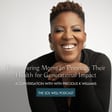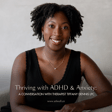
The Mental Breakdown: More Than Sad - The Truth About Major Depressive Disorder
Welcome to this episode of The Mental Breakdown, a short and intentional weekly mental health space by Sol Well, designed to raise awareness, spark reflection, and offer practical support—one topic at a time.
This week, we’re breaking down Major Depressive Disorder (MDD) — a clinical diagnosis that’s often misunderstood, misused, or masked by shame and silence, especially in Black and Brown communities and among mothers.
We unpack:
- What MDD really is, and how it differs from temporary sadness or “feeling down.”
- The core symptoms and criteria used for diagnosis — including emotional, physical, and cognitive impacts.
- How MDD shows up in the lives of moms, especially those navigating pressure to appear strong or “hold it all together.”
- The barriers and disparities faced by Black and Brown women in getting properly screened, diagnosed, and treated.
- The harm of toxic positivity and why gratitude isn’t a cure for depression.
- Culturally responsive treatment options and support approaches that can help.
- An intentional “Mood Check-In” grounding practice and an affirmation to close out the episode.
Whether you’re silently navigating depression, suspect you or a loved one may be living with MDD, or simply want to better understand this condition — this episode offers a grounded, validating, and practical breakdown of a very real experience.
Mentioned Stats & Resources:
- American Psychiatric Association: Racial disparities in diagnosis and care
- National Institute of Mental Health (NIMH) – MDD overview: https://www.nimh.nih.gov/health/statistics/major-depression
- Mental Health America (MHA): https://mhanational.org/conditions/depression
- Therapy for Black Girls – Therapist directory and mental health support: https://www.therapyforblackgirls.com
- Postpartum Support International (PSI) – Resources for maternal mental health: https://www.postpartum.net
Connect + Support
If this episode resonated with you or someone you love, share it, DM Autumn, or join our village at Sol Well. It take a village to raise a mother🩺
Disclaimer: This episode is for educational purposes only and is not a substitute for professional mental health advice, diagnosis, or treatment. Please speak with a licensed provider for support tailored to you.




![Life after [baby] loss A conversation with Alishia Anderson image](https://media.zencastr.com/cdn-cgi/image/width=112,quality=85/image-files/61fb5028559b7100aee9f217/492cabf0-4479-488c-b19c-2873fe6bdce8.png)














